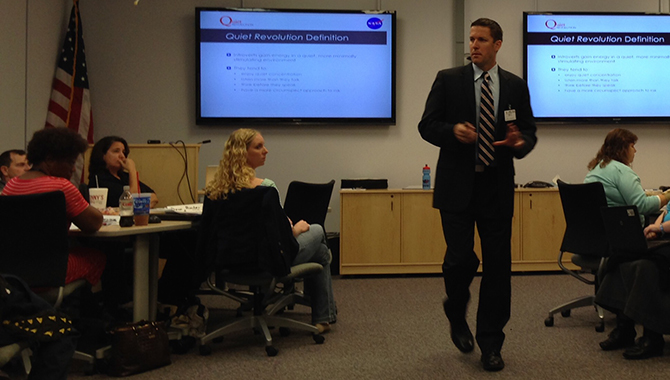
Quiet Project Management instructor Mike Erwin engages participants in the pilot course at the Academy Center for Excellence.
Photo Credit: Roger Forsgren / NASA APPEL
The NASA workforce is highly talented, yet some employee potential may be overlooked. A new APPEL pilot course shows how to capture that potential.
What is the ideal environment for the NASA workforce to flourish? With research suggesting that as much as half of the population considers themselves introverted, organizations that understand how to create work situations in which introverts are more productive could access greater employee potential. APPEL News recently spoke with APPEL Director Roger Forsgren to learn more about Quiet Project Management, a new APPEL pilot course that could open the door to enhanced productivity and stronger project team dynamics.
APPEL News: What is Quiet Project Management?
Roger Forsgren: Quiet Project Management is a new course we recently piloted at the Academy Center for Excellence. The one-day course is based on Susan Cain’s bestselling book, “Quiet: The Power of Introverts in a World That Can’t Stop Talking.” If you haven’t had an opportunity to read the book, I highly recommend you view Susan’s TED talk. It is one of the most-viewed talks on TED.com. [You can view Susan Cain’s TED talk, “The Power of Introverts,” here.]
APPEL News: How did you first hear about “Quiet: The Power of Introverts in a World That Can’t Stop Talking” and what made you think of applying the concept to a project management context?
Forsgren: I consider myself to be an introvert, so I was naturally attracted to Susan’s book. I found her description of introversion to be compelling, something I’ve never really thought about. But the issue I found most interesting and applicable to our project management training at APPEL was the idea that too often introverts are overlooked or simply overwhelmed by the extroverts in the room. Introverts have a lot to offer a project team. Just because they appear quiet does not mean they are too shy to speak up; for the most part, introverts are “quiet” because by their nature they prefer to think things out, to make sure they know what they are talking about before they open their mouths. Teams and organizations can grow stronger if they understand more about the ideal environment in which introverts feel comfortable so they can be productive and tap into their natural strengths.
APPEL News: What interests you about the course Quiet Project Management?
Forsgren: From a leadership or project manager’s perspective, I think this concept opens the door to a huge amount of employee potential that may have been overlooked previously. To be honest, many technical folks are by nature introverts—there’s even been a study that suggests one-third to half of the world’s population considers themselves introverted. We generally live in a world dominated by extroverts, but there are a lot of folks on our teams and projects that think and act differently, and who also have a lot to contribute if we know “what makes them tick.”
APPEL News: Who do you see as the target audience for Quiet Project Management?
Forsgren: Everyone who is interested in managing a team at NASA. And especially extroverts and extroverted managers. In order to develop a well-balanced team in which everyone feels they are contributing, it’s really imperative that a manager understand how to get the best out of each employee. At our pilot course, we had a great mixture of extroverts and introverts. The discussions were compelling because extroverts learned that their coworkers were not anti-social; they just needed quiet time for reflection and prefer to listen closely in meetings and digest what they hear before they decide to speak. Introverts learned that extroverts operate differently: they are stimulated by group settings and discussions and sometime need to speak out loud in order to gather their thoughts.
APPEL News: What skills or benefits will participants gain from attending Quiet Project Management?
Forsgren: One key thing you’ll get from attending the course is to realize introverts are not “shy.” Shyness is a fear of social disapproval while introversion is a preference for quiet environments and less outside stimulation. Introverts require quiet time to think things out.
Another important take-away from the class is to understand that introverts can be very good leaders. Gandhi was an introvert and he changed the English Empire. Rosa Parks was an introvert and she changed our country. Introverts spend a lot of quiet time thinking. Perhaps not coincidentally, some of the greatest inventors and innovators—such as Albert Einstein, Bill Gates, and Steve Wozniak—have been introverts. I guess the message is: you don’t want to ignore that kind of potential horsepower.
On another important note, the course helps introverts act out of character when the times call for it. Rather than kicking yourself for not speaking up in a meeting, the course shows how you can and should act out of character to make a point. Yes, you may be out of your comfort zone, but afterwards you’ll have peace of mind and can regenerate.
APPEL News:The course sounds like it will be valuable to project management teams. How can NASA employees get it offered at their centers?
Forsgren: The best thing to do is for interested people to contact the APPEL Points of Contact (POCs) for their center. They can find a list of the APPEL POCs for each center on the APPEL website.
Quiet Project Management was recently piloted at the Academy Center for Excellence and is being evaluated for inclusion in APPEL’s regular course offerings. The course is taught by West Point graduate and instructor Major Mike Erwin. Mike is the CEO of the Quiet Leadership Institute, whose mission is to help organizations improve their performance through the understanding and empowerment of their introverted employees.









